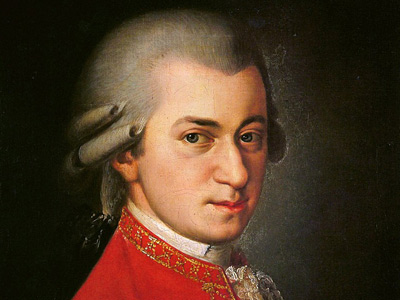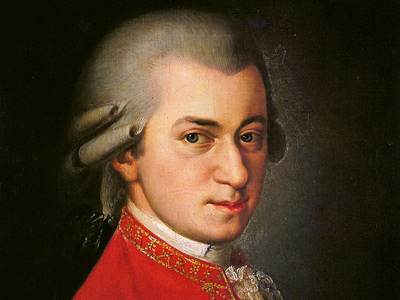Wolfgang Amadeus Mozart (1756-1791)

1781: Departure
In January 1781, Mozart's opera Idomeneo premiered with "considerable success" in Munich. The following March, Mozart was summoned to Vienna, where his employer, Archbishop Colloredo, was attending the celebrations for the accession of Joseph II to the Austrian The Archduchy of Austria was a major principality of the Holy Roman Empire and the nucleus of the Habsburg monarchy. With its capital at Vienna, the archduchy was centered at the Empire's southeastern periphery. The archduchy's history as an imperial state ended with the dissolution of the Holy Roman Empire in 1806. It was replaced with the Lower and Upper Austria crown lands of the Austrian Empire. throne. For Colloredo, this was simply a matter of wanting his musical servant to be at hand (Mozart indeed was required to dine in Colloredo's establishment with the valets and cooks.) But Mozart was planning a bigger career even as he continued in the archbishop's service; for example, to his father he wrote:
The Archduchy of Austria was a major principality of the Holy Roman Empire and the nucleus of the Habsburg monarchy. With its capital at Vienna, the archduchy was centered at the Empire's southeastern periphery. The archduchy's history as an imperial state ended with the dissolution of the Holy Roman Empire in 1806. It was replaced with the Lower and Upper Austria crown lands of the Austrian Empire. throne. For Colloredo, this was simply a matter of wanting his musical servant to be at hand (Mozart indeed was required to dine in Colloredo's establishment with the valets and cooks.) But Mozart was planning a bigger career even as he continued in the archbishop's service; for example, to his father he wrote:
My main goal right now is to meet the emperor in some agreeable fashion, I am absolutely determined he should get to know me. I would be so happy if I could whip through my opera for him and then play a fugue or two, for that's what he likes
Mozart did indeed soon meet the Emperor, who eventually was to support his career substantially with commissions and a part-time position.
In the same letter to his father just quoted, Mozart outlined his plans to participate as a soloist in the concerts of the Tonkünstler-Societät, a prominent benefit concert series; this plan as well came to pass after the local nobility prevailed on Colloredo to drop his opposition.
Colloredo's wish to prevent Mozart from performing outside his own establishment was in other cases, however, carried through, raising the composer's anger; one example was a chance to perform before the Emperor at Countess Thun's for a fee equal to half of his yearly Salzburg salary.
The quarrel with the archbishop came to a head in May: Mozart attempted to resign and was refused. The following month, permission was granted, but in a grossly insulting way: the composer was dismissed literally "with a kick in the arse", administered by the archbishop's steward, Count Arco. Mozart decided to settle in Vienna as a freelance performer and composer.
The quarrel with the archbishop went harder for Mozart because his father sided against him. Hoping fervently that he would obediently follow Colloredo back to Salzburg, Mozart's father exchanged intense letters with his son, urging him to be reconciled with their employer. Mozart passionately defended his intention to pursue an independent career in Vienna. The debate ended when Mozart was dismissed by the archbishop, freeing himself both of his employer and his father's demands to return. Solomon characterizes Mozart's resignation as a "revolutionary step", and it greatly altered the course of his life.
HISTORY

RESOURCES
This article uses material from the Wikipedia article "Wolfgang Amadeus Mozart", which is released under the Creative Commons Attribution-Share-Alike License 3.0.
© Stories Preschool. All Rights Reserved.










